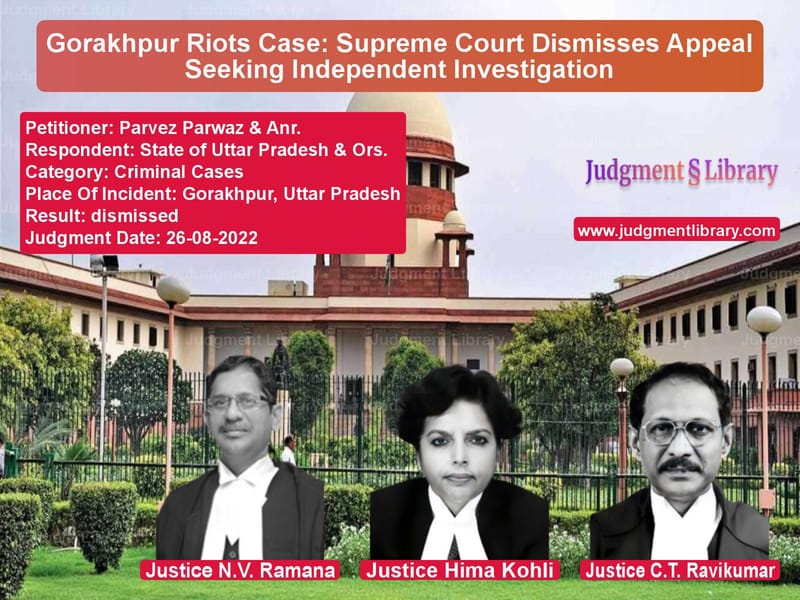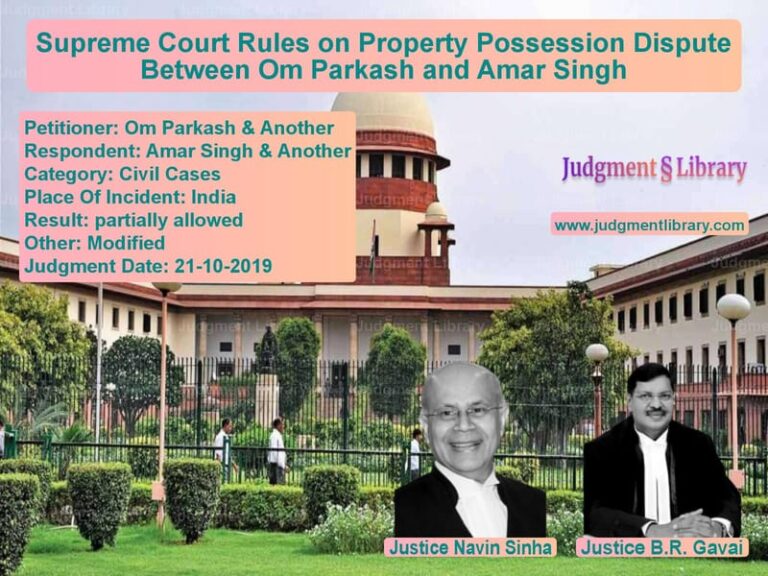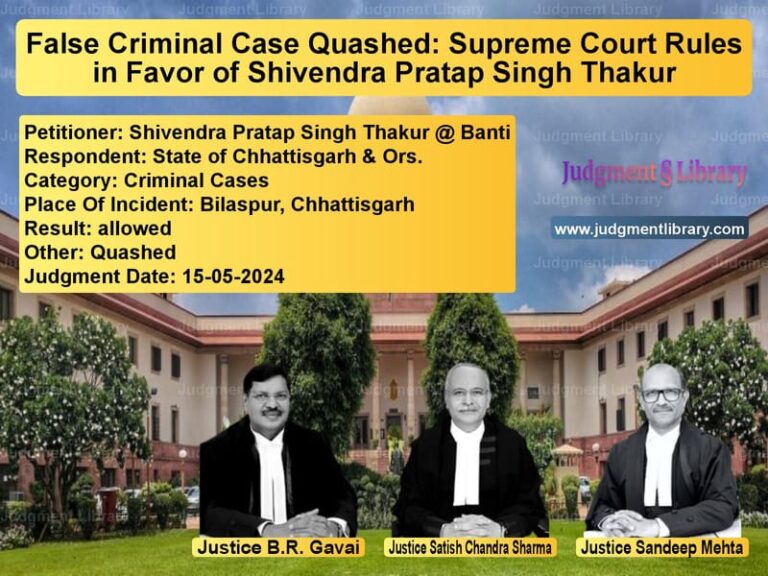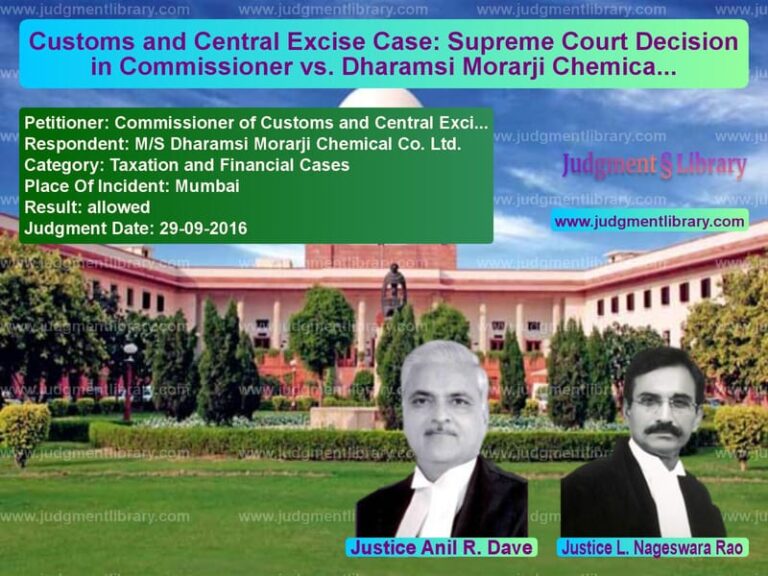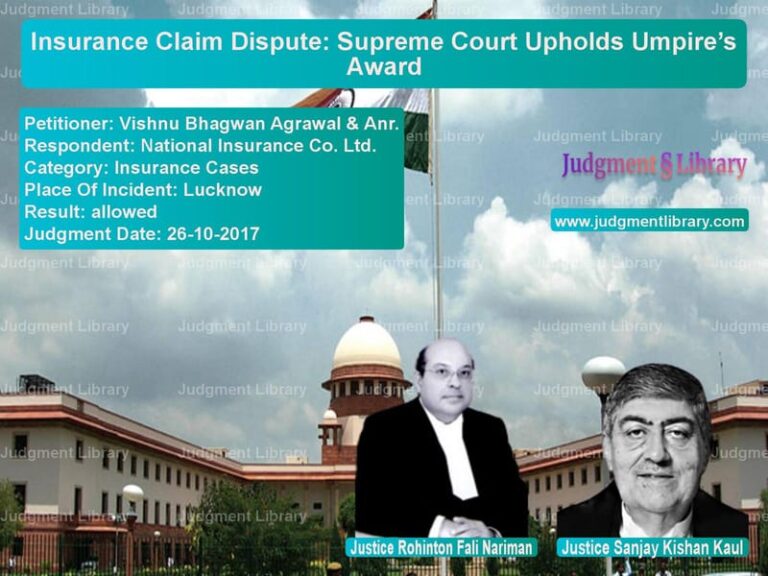Gorakhpur Riots Case: Supreme Court Dismisses Appeal Seeking Independent Investigation
The case of Parvez Parwaz & Anr. vs. State of Uttar Pradesh & Ors. was a high-profile legal battle centered around allegations of hate speech and its alleged connection to the 2007 Gorakhpur riots. The case involved a First Information Report (FIR) filed against Yogi Adityanath, who was then a Member of Parliament and later became the Chief Minister of Uttar Pradesh. The Supreme Court was called upon to decide whether the investigation into the case was biased and whether an independent agency should take over.
Background of the Case
The matter began when the first appellant, Parvez Parwaz, filed an FIR (Crime No. 2776/2008) against Yogi Adityanath and others, accusing them of delivering hate speeches that allegedly incited the 2007 Gorakhpur riots. The State Government initially assigned the investigation to the Crime Branch of the Criminal Investigation Department (CB-CID) of the Uttar Pradesh Police.
Unhappy with the progress and fairness of the investigation, the appellants approached the Allahabad High Court in 2008 through a writ petition under Article 226 of the Constitution, seeking:
- An independent investigation into the case instead of the CB-CID handling it.
- Inclusion of additional charges under various sections of the Indian Penal Code (IPC) and Prevention of Damage to Public Property Act, 1984.
- Disciplinary action against officials who failed to act against the accused.
- Security protection for the petitioners.
Issues Framed by the High Court
The High Court framed three key legal issues for determination:
- Whether the High Court has the power under Article 226 of the Constitution to transfer an investigation when the State fails to conduct a fair and impartial probe.
- Whether, in this case, the State failed to conduct a fair investigation, thereby warranting a transfer to an independent agency.
- Whether the State, under Section 196 of the Code of Criminal Procedure (CrPC), can decide on sanctioning prosecution when the accused has later become the Chief Minister and is the executive head of the State.
After extensive hearings, the High Court dismissed the writ petition on 22.02.2018, ruling that the investigation was conducted fairly and that no procedural irregularities warranted an independent probe.
Read also: https://judgmentlibrary.com/supreme-court-acquits-accused-in-1979-uttar-pradesh-murder-case/
Supreme Court Appeal
The appellants challenged the High Court’s ruling before the Supreme Court, arguing that the investigation was biased, especially because the accused had become the Chief Minister of the State.
Arguments Presented
Appellants’ Arguments
- The appellants contended that the investigation lacked fairness and impartiality.
- They pointed out that since Yogi Adityanath had become the Chief Minister, the decision to grant sanction for prosecution should have been made by the Governor, not the State Government.
- They cited the Supreme Court’s judgment in M.P. Special Police Establishment v. State of M.P. (2004) 8 SCC 788, which held that in cases involving a Chief Minister, an independent authority should decide on prosecution sanctions.
Respondents’ Arguments
- The State of Uttar Pradesh argued that the case had become moot as the investigation had already been concluded, and a closure report had been filed.
- They asserted that the evidence, particularly a CD that allegedly contained the hate speech, had been found to be tampered with, as per a Central Forensic Science Laboratory (CFSL) report.
- They contended that the High Court had correctly ruled that there was no need to transfer the investigation to an independent agency.
Supreme Court’s Analysis and Judgment
The Supreme Court examined whether the investigation had been conducted fairly and whether the decision to deny sanction for prosecution was legally sound.
Key Observations by the Supreme Court
- The Court acknowledged that under Section 196 of the CrPC, the sanction for prosecution is required before a trial court can take cognizance of certain offenses.
- It noted that a forensic analysis found the CD evidence to be tampered with, weakening the case against the accused.
- The Court recognized that a closure report had already been filed, and a protest petition was pending before the trial court.
- Given the circumstances, the Court concluded that reviewing the sanction issue would be an academic exercise with no practical outcome.
Key Court Statement
“We do not think it necessary to go into the contentions raised by both sides on the issue of denial of sanction for prosecution and the legal pleas sought to be raised in relation to the said issue. However, we think it appropriate that the legal questions on the issue of sanction be left open to be considered in an appropriate case.”
Final Judgment
- The Supreme Court dismissed the appeal, affirming the High Court’s decision.
- It ruled that the case had become moot since the investigation had been completed and a closure report had been filed.
- However, the Court left open the broader legal question of whether a Chief Minister’s government can decide on sanctioning prosecution in cases where the Chief Minister is an accused.
Implications of the Judgment
The ruling has significant implications for similar cases:
- It clarifies that courts will not interfere in criminal investigations unless there is a clear violation of procedural fairness.
- It reaffirms that sanction for prosecution under Section 196 CrPC is a bar only on cognizance by the court, not on investigation or filing of an FIR.
- It leaves open the broader constitutional question of whether a Chief Minister’s government can decide on prosecution sanctions involving the Chief Minister.
Conclusion
The Supreme Court’s decision in this case underscores the importance of procedural integrity in criminal investigations. While the petitioners failed to prove a lack of fairness in the probe, the judgment does not close the door on the question of how prosecution sanctions should be handled when the accused holds high office. The ruling serves as a precedent for future cases involving allegations against public officials and highlights the judiciary’s cautious approach in intervening in ongoing criminal investigations.
Petitioner Name: Parvez Parwaz & Anr..Respondent Name: State of Uttar Pradesh & Ors..Judgment By: Justice N.V. Ramana, Justice Hima Kohli, Justice C.T. Ravikumar.Place Of Incident: Gorakhpur, Uttar Pradesh.Judgment Date: 26-08-2022.
Don’t miss out on the full details! Download the complete judgment in PDF format below and gain valuable insights instantly!
Download Judgment: parvez-parwaz-&-anr.-vs-state-of-uttar-prade-supreme-court-of-india-judgment-dated-26-08-2022.pdf
Directly Download Judgment: Directly download this Judgment
See all petitions in Bail and Anticipatory Bail
See all petitions in Custodial Deaths and Police Misconduct
See all petitions in SC/ST Act Case
See all petitions in Other Cases
See all petitions in Judgment by N.V. Ramana
See all petitions in Judgment by Hima Kohli
See all petitions in Judgment by C.T. Ravikumar
See all petitions in dismissed
See all petitions in supreme court of India judgments August 2022
See all petitions in 2022 judgments
See all posts in Criminal Cases Category
See all allowed petitions in Criminal Cases Category
See all Dismissed petitions in Criminal Cases Category
See all partially allowed petitions in Criminal Cases Category

